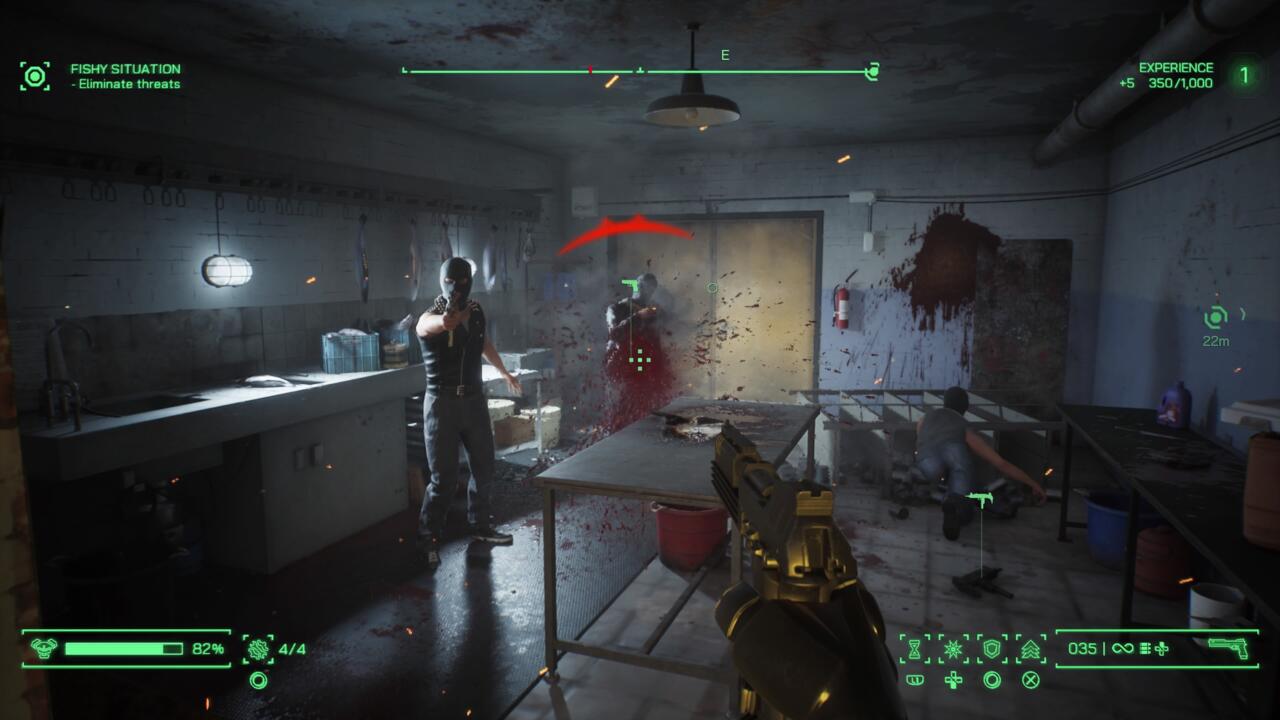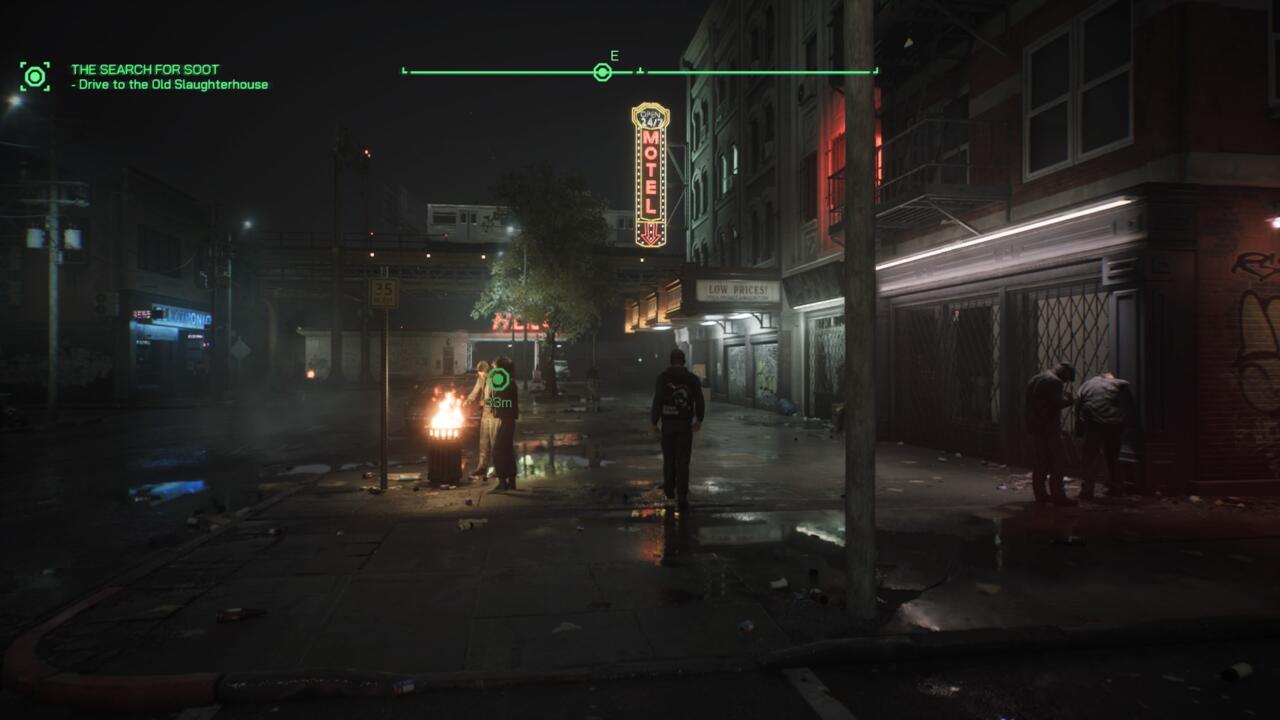RoboCop: Rogue City is a love letter to the 36-year-old sci-fi franchise. Teyon, the studio behind Terminator: Resistance and Rambo: The Video Game, clearly has a soft spot for ’80s action movies, and this reverence is woven into the very fabric of Rogue City’s design. From the environments to the soundtrack to the satirical style, it captures the look, sound, and vibe of the first two RoboCop movies with exceptional aplomb, while also making you feel like you’re fully embodying the titular supercop. Pistons whir with each heavy footstep of your titanium frame as you shrug off damage and methodically dispatch criminal scum with the lethal precision of a machine. There’s something admirable about this adherence to authenticity, yet being a near-unstoppable force doesn’t always make for the most compelling video game. Rogue City often appears as though it’s stuck at a crossroads between being faithful to the source material and presenting an enjoyable first-person shooter, and it only sometimes strikes a satisfying balance.
Rogue City’s story feels genuine by etching a brand-new tale into the series’ familiar narrative framework, but this is another area where Teyon sometimes sticks too closely to the original two movies’ vision. Set between the events of RoboCop 2 and RoboCop 3, Rogue City sees you play as Old Detroit cop Alex Murphy–with Peter Weller reprising the famous role–who’s been rebuilt as the cyborg RoboCop after being fatally wounded in the line of duty. The game opens with a satirical news segment that would feel right at home in Paul Verhoeven’s 1987 film, establishing the crime-riddled state of Old Detroit. Nuke, the highly addictive designer drug introduced in RoboCop 2, is still proliferating on the streets, and now there’s a new crime boss in town who has the rest of the city’s gangs lining up to work for him. Putting a stop to this new wave of crime is your prime directive, but the story also explores a number of sub-plots with mixed results.
At the conclusion of the game’s first mission, for instance, RoboCop malfunctions in a dangerous hostage situation and begins having flashbacks to the life he used to have as a loving husband and father. Mega-corporation Omni Consumer Products (OCP) is eager to fix its faulty hardware, even going as far as to hire a therapist for RoboCop to talk to. The original movies explored themes of control and free will and touched on the dichotomy of RoboCop’s very existence, but these moments were often clumsily handled and never reached a particularly satisfying conclusion. Rogue City allows you to delve deeper into Murphy’s psyche by choosing various dialogue options during your mandated therapy sessions. You can toe the line and say you’re just a machine or that it doesn’t matter either way, or you can opt to dig further and explore Murphy’s relationship with his humanity and personal identity. There are some interesting moments that arise from these conversations and the way your answers influence how others perceive you, but it also doesn’t say anything we haven’t heard before, either within RoboCop’s own fiction or in other media. As a result, Rogue City feels like it’s simply retreading old ground and falling into the same pitfalls the movies once did.

Gallery
Other sub-plots focus on the corporate corruption within OCP that threatens RoboCop and his fellow police officers, and the tenacious investigative journalist working the case. There’s also a thread involving an earnest new cop who needs to be shown the ropes, and a mayoral election that has both candidates seeking RoboCop’s endorsement. This is all fairly by-the-numbers action movie stuff with some predictable twists and turns along the way. It also covers a lot of the same ground as the first two movies, from displacing the poor for gentrified districts to Detroit PD threatening to strike over OCP’s mishandling of the department. There are enough intriguing moments to help carry the story to its conclusion, but it runs into a few pacing issues during the latter half, particularly when some of these disparate threads collide. There are multiple instances where it appears to be reaching a conclusion only to continue on for another few hours, which dulls any sense of momentum it might’ve achieved.
Peter Weller is excellent as RoboCop, however, effortlessly slipping back into the role as though he never left. He perfectly delivers all of the deadpan lines and catchphrases you could ask for, adding equal amounts of levity and standout moments where you can’t help but jump up shouting, “That’s RoboCop!” Familiar supporting characters like Anne Lewis and Sergeant Reed also appear–albeit voiced by different actors–contributing to the game’s fantastic sense of place and authenticity. It borrows the visual language of RoboCop down to a tee, complete with one-to-one set recreations that help nail the look and feel of an era of movies in a way that hasn’t been done since Alien: Isolation’s opening.
This carries over into the RoboCop power fantasy that is Rogue City’s meticulous combat. Even at full sprint, Murphy’s movement is best described as plodding–and he can’t jump, roll, or slide either–so the game’s action never comes close to replicating a modern FPS. Instead, you’re essentially a walking tank, able to withstand heavy damage while methodically dispatching waves of enemies using RoboCop’s signature Auto-9 machine pistol. Shooting the ruffians of Old Detroit in the head never gets old, as craniums pop like watermelons, dousing the environment in blood and gore with a satisfying splat. You can launch bulky CRT monitors at enemies for a change of pace, or simply punch straight through them using RoboCop’s enhanced strength. There’s also a skill tree that gradually unlocks more abilities for you to utilize, including a flashbang-esque stun attack and slow-motion vision, but even with these peripheral additions, there isn’t a ton of depth to the combat.
This might sound counterintuitive, but Rogue City is at its best when you’re able to clear out a room with relative ease, soaking up bullets as you blow heads and limbs off in over-the-top fashion. When you think of RoboCop in the movies, you picture a relentless and unstoppable force, and Rogue City excels when it’s able to replicate just that. This shallow approach might not be enough to sustain a full game without eventually giving way to repetition–and it would benefit from being a shorter game–but most attempts to inject a sense of challenge into the formula fall flat. Once enemy numbers begin to grow in tandem with their health bars, your only recourse is to stand behind walls in order to avoid sustaining too much damage. Instead of gaudy action that’s over in a flash, firefights turn into dull and prolonged shootouts as you’re forced to grind down enemies from behind cover. These moments don’t play to RoboCop’s strengths because you no longer feel like RoboCop. Its best moments occur when it feeds into the inherent power fantasy of being a superpowered force. Even if it might not make for the most compelling shooter, fully embodying the man-turned-machine and his near-invulnerability is consistently rewarding and the game’s greatest selling point. Rogue City falters when it veers away from this.
When you’re not stopping drug dealers and murderers with lethal force, Rogue City offers a change of pace by sending you out on patrol. There are a few moments throughout the game where you’ll revisit the same run-down neighborhood and can break off from the main story to assist local citizens and deal with petty crimes. There’s something funny about a state-of-the-art cyborg issuing parking tickets, and you’ll also deal with other minor offenses like noise complaints, graffiti, and littering. You’re given some leeway in how you handle these lawbreakers, either putting faith in the public trust by letting them off with a warning or exacting the letter of the law by issuing a ticket–with these decisions and your other choices impacting the game’s ending. It’s also here where you’ll engage with some of Rogue City’s light RPG mechanics, especially when it comes to solving some of the more elaborate side quests. One of these sees you busting a drug operation by tracking down a dealer who’s been stealing from all of the other dealers, while another tasks you with solving a murder that’s tangentially related to a commercial for toxic sunscreen. These quests tend to be entertaining and also give you a chance to flex RoboCop’s police muscles outside of combat. You can glean information by talking to people or by exploring the environment and using your scanning capabilities to detect evidence. None of this is particularly deep, but it makes for a more well-rounded RoboCop game.

Gallery
This veritable slice of downtown Detroit is also an excellent example of a miniature open world. In many ways it feels comparable to the most recent Deus Ex games, giving you a play area that’s just big enough and stuffed with just enough things to make exploration rewarding. It fully embraces RoboCop’s sci-fi ’80s aesthetic, too, with payphones, a VHS store, a noisy arcade, and an electronics store crammed with CRT televisions. The only downside is that there isn’t another hub area to explore in the game’s latter half. Returning to the same streets for the third time is a little boring, even if the time of day has changed. I played the PS5 version of the game and also ran into performance issues in these open areas and when the action gets busy with multiple characters and special effects on screen at the same time. The quality mode is locked at 30fps and does a decent job of maintaining it, but the performance mode regularly dips below 60fps despite the major hit to image quality. The action is slow enough that playing in quality mode is preferable, but this is a matter of taste and it’s still disappointing that it struggles so much in performance mode.
It’s a well-worn cliche at this point, but if you’re a fan of RoboCop, then you’ll find a lot to love in Rogue City. It’s chock full of Easter eggs and manages to capture the look and feel of the first two RoboCop movies with excellent attention to detail, even getting Peter Weller to reprise his role as the eponymous hero. More than anything, it does a tremendous job of making you feel like RoboCop in its best moments. Combat is shallow because of this devotion to authenticity, but it excels when you’re able to fully personify the relentless killing machine. It missteps when moving away from this, resulting in some dull firefights, yet these failings are mitigated somewhat by its embrace of a well-rounded RoboCop, regularly breaking away from the action for more nuanced moments of crime fighting. Rogue City might not be for everyone, but at least it’s not RoboCop 3.
Stay connected with us on social media platform for instant update click here to join our Twitter, & Facebook
We are now on Telegram. Click here to join our channel (@TechiUpdate) and stay updated with the latest Technology headlines.
For all the latest gaming News Click Here
For the latest news and updates, follow us on Google News.
